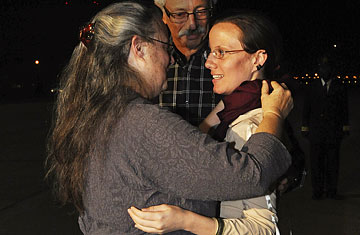
Sarah Shourd, right, embraces her mother Nora at the royal airport in Muscat, Oman, on Sept. 14, 2010
There will undoubtedly be some observers who will take Iran's release of an American hiker held for more than a year on spying charges as a portent of rapprochement in the fraught U.S.-Iran relationship, but that would be unwise. Nothing is ever simple when it comes to the Islamic Republic, and the tug of war between different arms of the Iranian government that preceded Sarah Shourd's release on Tuesday reveals a level of chaos and political infighting inside the regime that could complicate future diplomatic efforts.
Shourd's two hiking companions, Shane Bauer and Josh Fattal, remain imprisoned in Tehran, and the Iranian authorities released her only on humanitarian grounds after a bail payment was made to a bank in Oman. (She is reported to be ill, and the Iranians have a history of releasing captives whose health is deteriorating, which diminishes whatever value the regime sees in holding them.) Still what was most notable about Shourd's release was the rebuke it involved for President Mahmoud Ahmadinejad at the hands of his own judiciary.
Ahmadinejad had originally planned to schedule the captive's release for Saturday, in a ceremony at the presidential palace, as part of an effort to showcase his magnanimity ahead of his visit to the U.N. General Assembly in New York City later this month. But when that news spread, a halt was called by Iran's judiciary — controlled by rival conservatives who are loyal to Supreme Leader Ayatullah Ali Khamenei but antagonistic to Ahmadinejad, not least for usurping the powers of other arms of government. The release of prisoners awaiting trial was a matter for the judiciary, they said, and they insisted on the bail payment of $500,000 — and ensured there would be no ceremony at which the President could aggrandize himself.
"The judiciary, one of the many institutions Ahmadinejad has offended, was prepared to release Ms. Shourd, but not to let him get the credit for it," says Gary Sick, a Columbia University Iran expert and former National Security Council official. "They made clear that the release was their game, not his. The infighting in Tehran is really vicious right now, and more publicly visible than it's ever been. Ahmadinejad was really embarrassed by this."
Adds Farideh Farhi, an Iran analyst at the University of Hawaii: "This was simply a case of different bodies of government each responding differently for its own reasons. It represents a degree of chaos in the regime rather than easily defined factional battles. The judiciary needed to project an appearance of independence. After all, every time Ahmadinejad goes to New York and is asked about this or that prisoner, he always answers that it's not up to him, because Iran's judiciary is independent."
Ahmadinejad and the forces behind him are, in fact, in a state of open conflict not only with the judiciary but also with Iran's elected parliament, the Foreign Ministry (which reports to the Supreme Leader) and the Guardian Council, the appointed clerical body created precisely for the purpose of resolving disputes between different parts of Iran's complex theocratic quasi democracy. Those bodies are all controlled by rival conservatives, some of them loyal to the Supreme Leader. The President, who relies heavily on backing from the Revolutionary Guards Corps, is also increasingly at odds with much of the conservative clergy. There have even been signs of open conflict between the President and the Supreme Leader, who threw his weight behind Ahmadinejad during the chaotic aftermath of last year's contested election when the legitimacy of the incumbent's re-election was challenged by reformists and rival conservatives.
Despite the intensity of the feuding, the factional battles aren't reducible to any neat hawk-vs.-dove characterizations; they're all about power and its prerogatives in a system that puts final executive authority in the hands of an unelected clergy, but creates some measure of separation of powers with elected institutions. While reformists criticize Ahmadinejad for trampling on democracy, clerics attack him for trying to usurp their authority and violating the tenets of clerical guardianship over the affairs of state that are at the heart of the Iranian system.
"It gets down to a question of who's in charge," says Sick. "Ahmadinejad is asserting the autonomous powers of the presidency in a way we haven't seen before, even pushing back against the Supreme Leader. And some see that as heresy."
The challenges for foreign powers dealing with Iran's increasingly fractious regime were underscored late last year when Ahmadinejad's representative negotiated a uranium-fuel-swap deal with Russia, France and the U.N. in Geneva and Vienna, only to have that deal nixed by rival conservatives in Tehran with the backing of the Supreme Leader. Even if a consensus exists on the basic terms of compromise on the nuclear issue, one school of thought holds that pulling off a rapprochement with the West would be too big a political prize to allow Ahmadinejad to claim for himself.
So, should the coming months present opportunities for diplomatic progress on the standoff between the West and Iran over its nuclear program, the handling of the release of Sarah Shourd suggests there could be significant conflict within the regime over control of any negotiating process. Negotiating with Iran has never been easy, of course, but the internecine power struggle in Tehran is likely to make it even more challenging.
